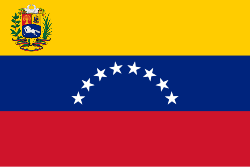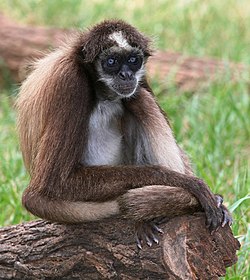Portal:Venezuela
The Venezuela Portal Venezuela, officially the Bolivarian Republic of Venezuela, is a country on the northern coast of South America, consisting of a continental landmass and many islands and islets in the Caribbean Sea. It comprises an area of 916,445 km2 (353,841 sq mi), and its population was estimated at 29 million in 2022. The capital and largest urban agglomeration is the city of Caracas. The continental territory is bordered on the north by the Caribbean Sea and the Atlantic Ocean, on the west by Colombia, Brazil on the south, Trinidad and Tobago to the north-east and on the east by Guyana. Venezuela consists of 23 states, the Capital District, and federal dependencies covering Venezuela's offshore islands. Venezuela is among the most urbanized countries in Latin America; the vast majority of Venezuelans live in the cities of the north and in the capital. The territory of Venezuela was colonized by Spain in 1522, amid resistance from Indigenous peoples. In 1811, it became one of the first Spanish-American territories to declare independence from the Spanish and to form part of the first federal Republic of Colombia (Gran Colombia). It separated as a full sovereign country in 1830. During the 19th century, Venezuela suffered political turmoil and autocracy, remaining dominated by regional military dictators until the mid-20th century. From 1958, the country had a series of democratic governments, as an exception where most of the region was ruled by military dictatorships, and the period was characterized by economic prosperity. Venezuela is officially a federal presidential republic, but has experienced democratic backsliding under the Chávez and Maduro administrations, shifting into an authoritarian state. It ranks poorly on international measurements of freedom of the press, civil liberties, and control of corruption. Venezuela is a developing country, has the world's largest known oil reserves, and has been one of the world's leading exporters of oil. Previously, the country was an underdeveloped exporter of agricultural commodities such as coffee and cocoa, but oil quickly came to dominate exports and government revenues. Venezuela struggles with record hyperinflation, shortages of basic goods, unemployment, poverty, disease, high child mortality, malnutrition, environmental issues, severe crime, and widespread corruption. US sanctions and the seizure of Venezuelan assets overseas have cost the country $24–30 billion. These factors have precipitated the Venezuelan refugee crisis in which more than 7.9 million people had fled the country by May 2025. By 2017, Venezuela was declared to be in default regarding debt payments by credit rating agencies. The crisis in Venezuela has contributed to a rapidly deteriorating human rights situation. (Full article...) Selected article - The Baralt Theatre (Spanish: Teatro Baralt) is a theatre in downtown Maracaibo, Venezuela, at the northwestern corner of the historic Plaza Bolívar. The first theatre at the site was built in the mid 19th century as a small performance hall, with subsequent theatre buildings there having seen many different reconstructions. A major Venezuelan cultural institution, the theatre received a National Monument designation in 1981, recognizing its location as the site of the first film screenings in the country and as a longstanding part of the historic center of Maracaibo. (Full article...) Selected picture
The Parque Cristal is an office and recreation building located on Avenida Francisco de Miranda in Caracas, Venezuela, which has become a famous landmark. The building is 103 meters high and has 18 floors for work and recreational space. It was designed by Jimmy Alcock, who won the Premio Metropolitano de Arquitectura for his design.
Selected biography - Gloria Lizárraga de Capriles (2 May 1944 – 31 March 2021) was a Venezuelan politician who was the first mayor of the Baruta municipality elected by direct vote, as well as the first woman elected to the position. She has been described as one of the pioneering women in Venezuelan politics. (Full article...) In this month...
Did you know (auto-generated) -
Selected list -The University City of Caracas is a World Heritage Site in Caracas, Venezuela. It is a functional university campus for the Central University of Venezuela, as well as home to 108 notable works of art and famous examples of creative architecture. Many works of art are modernist and mosaic. The campus was designed by architect Carlos Raúl Villanueva, who oversaw much of the construction and design work, with the artwork overseen by Mateo Manaure. Villanueva primarily enlisted artists who were either European or had European influences – Villanueva himself had been inspired for the campus design in Paris – including members of Los Disidentes, a group of Venezuelan artists who left for Europe to break from the Mexican mural tradition. Some artists did not initially want to work on the project, as they were opposed to the military dictatorship in place in Venezuela at the time, but French artist Fernand Léger encouraged them to participate by saying that "dictatorships pass but art remains"; part of Villanueva's intention was unity. Latin American art scholar Monica Amor wrote that Villanueva's Synthesis of the Arts philosophy, inspired by an André Bloc approach, "advocated a strong humanist approach to urban issues of reconstruction and social healing after the devastation of World War II." Amor noted that debate surrounding the dictatorship's funding of the project, and its realization in this context, persists into the 21st century. (Full article...) Current events
More did you know...
TopicsCategoriesRecognized content
Featured articlesGood articles
Featured pictures
New articlesThis list was generated from these rules. Questions and feedback are always welcome! The search is being run daily with the most recent ~14 days of results. Note: Some articles may not be relevant to this project.
Rules | Match log | Results page (for watching) | Last updated: 2025-11-17 20:47 (UTC) Note: The list display can now be customized by each user. See List display personalization for details.
Things you can doWikiProjects
Related portalsAssociated WikimediaThe following Wikimedia Foundation sister projects provide more on this subject:
Discover Wikipedia using portals
|



























